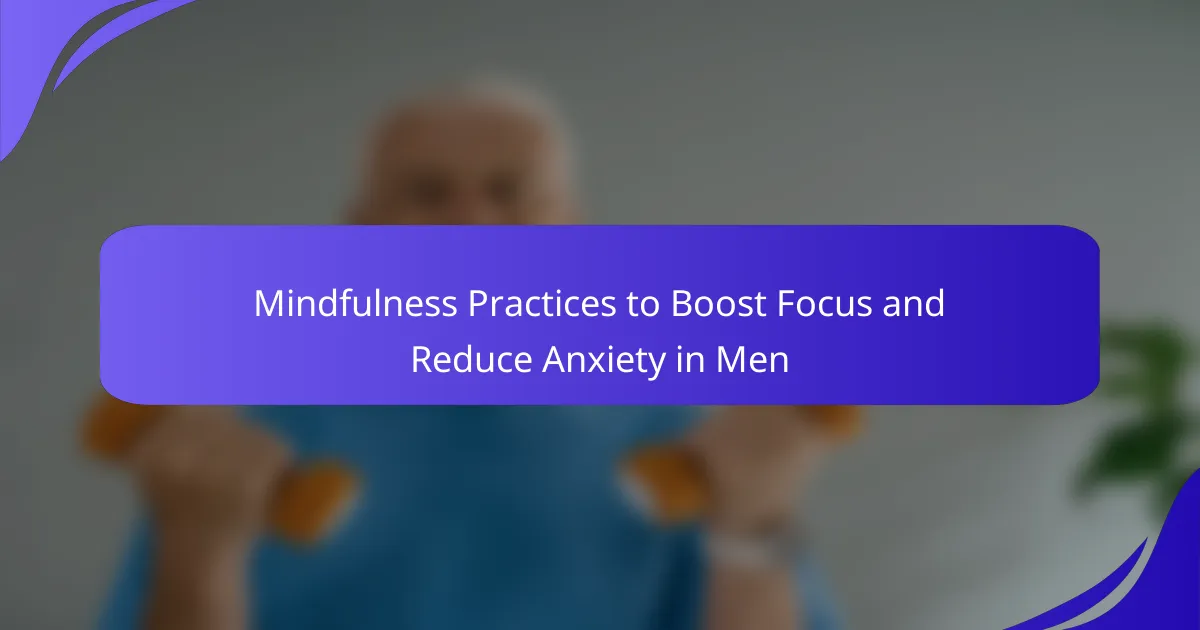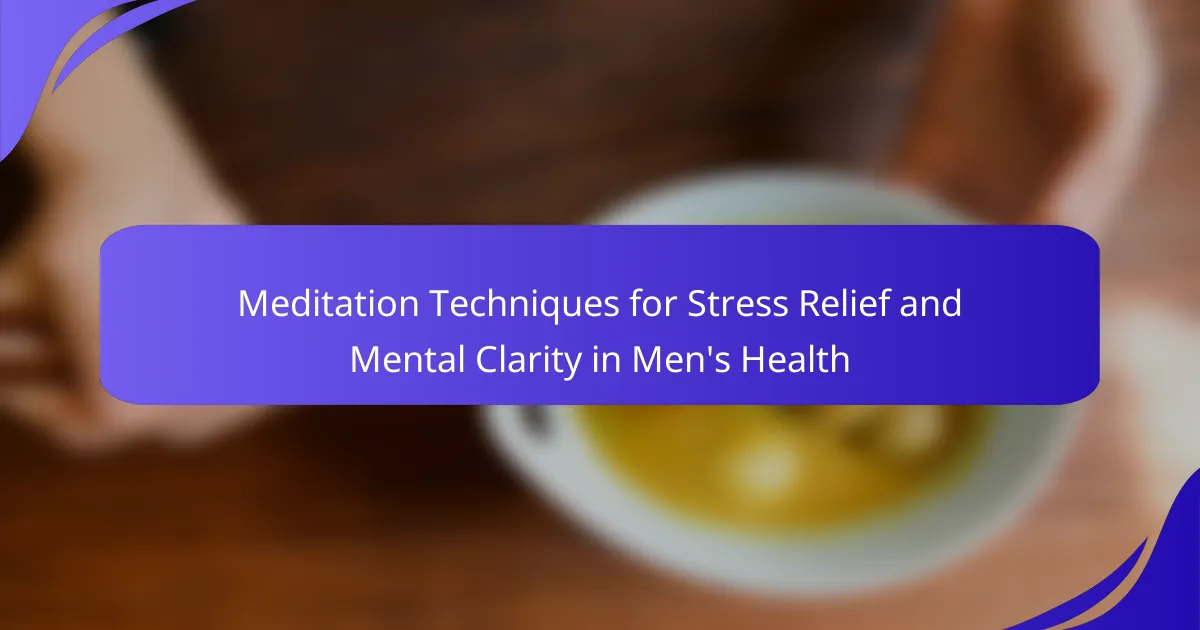Mindfulness practices can significantly enhance focus and reduce anxiety in men. Techniques such as meditation, deep breathing, and body scanning promote mental clarity and emotional regulation. Regular engagement in these practices leads to lasting changes in brain structure, improving overall mental well-being. Unique methods like forest bathing and mindful movement offer additional benefits tailored to men’s needs.
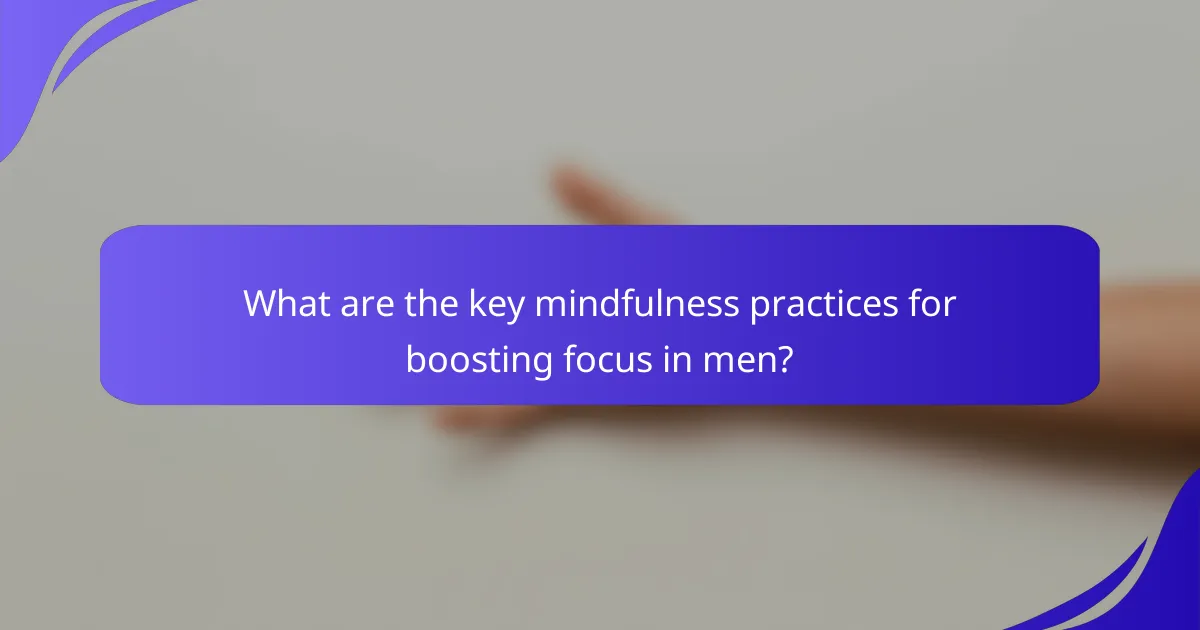
What are the key mindfulness practices for boosting focus in men?
Mindfulness practices such as meditation, deep breathing, and body scanning can significantly enhance focus and reduce anxiety in men. These techniques promote mental clarity and emotional regulation.
Meditation involves focused attention and can improve cognitive function. Deep breathing exercises help calm the mind and reduce stress, enhancing concentration. Body scanning increases awareness of physical sensations, fostering a present-moment focus.
Research indicates that regular mindfulness practice can lead to structural changes in the brain, particularly in areas related to attention and emotional regulation. Engaging in these practices consistently can yield long-term benefits for mental well-being and focus.
How does mindfulness improve concentration?
Mindfulness enhances concentration by training the mind to focus on the present moment. Regular mindfulness practices, such as meditation, can significantly reduce distractions and improve attention span. Research indicates that mindfulness can lead to increased gray matter density in brain areas associated with attention and emotional regulation. This neuroplasticity fosters better concentration over time, allowing individuals to engage more fully in tasks and manage anxiety effectively.
What techniques enhance mental clarity?
Mindfulness techniques such as meditation and deep breathing enhance mental clarity by promoting focus and reducing anxiety. Regular practice leads to improved cognitive function and emotional regulation. For example, studies show that mindfulness meditation can increase attention span and decrease stress levels, benefiting overall mental health.
How can breathing exercises be utilized for focus?
Breathing exercises enhance focus by promoting relaxation and reducing anxiety. These techniques, such as deep diaphragmatic breathing, increase oxygen flow, which improves cognitive function. As a result, men can experience heightened concentration and mental clarity. Regular practice can lead to significant improvements in daily focus and overall mindfulness.
What role does visualization play in maintaining concentration?
Visualization enhances concentration by providing a mental framework that directs focus and reduces distractions. It allows individuals to mentally rehearse tasks, improving performance and clarity. Techniques such as guided imagery can also alleviate anxiety, creating a calm state conducive to sustained attention. By integrating visualization into mindfulness practices, men can boost their focus while managing stress effectively.
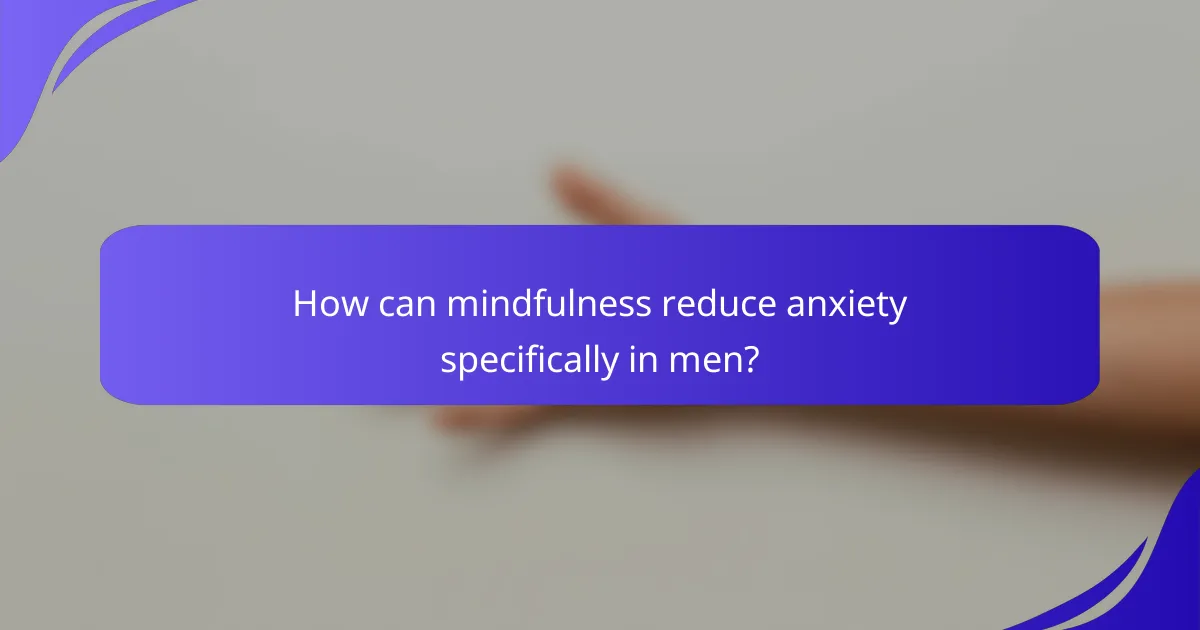
How can mindfulness reduce anxiety specifically in men?
Mindfulness practices can significantly reduce anxiety in men by promoting relaxation and enhancing emotional regulation. Techniques such as meditation, deep breathing, and body scanning help men develop greater awareness of their thoughts and feelings. This awareness allows them to manage stressors more effectively and decreases the likelihood of anxiety spiraling out of control. Research indicates that regular mindfulness practice can lead to a 30% reduction in anxiety symptoms. By fostering a non-judgmental attitude towards their experiences, men can cultivate resilience and improve overall mental well-being.
What are the psychological benefits of mindfulness for anxiety?
Mindfulness practices significantly reduce anxiety by enhancing emotional regulation and promoting relaxation. These practices foster present-moment awareness, which helps individuals detach from anxious thoughts. Research indicates that mindfulness meditation can lower cortisol levels, leading to decreased stress responses. Additionally, regular mindfulness practice improves focus, allowing men to manage anxiety more effectively. Engaging in mindfulness techniques can cultivate resilience, leading to a more balanced emotional state.
Which mindfulness techniques are most effective for anxiety relief?
Mindfulness techniques such as deep breathing, body scanning, and mindfulness meditation are effective for anxiety relief. These practices enhance awareness and promote relaxation, reducing stress levels significantly.
Deep breathing involves slow, deliberate inhalation and exhalation, which helps calm the nervous system. Body scanning focuses attention on different body parts, releasing tension and promoting a sense of grounding. Mindfulness meditation encourages individuals to observe thoughts without judgment, fostering emotional resilience.
Research shows that regular practice of these techniques can lead to a measurable decrease in anxiety symptoms. For instance, a study found that participants practicing mindfulness meditation experienced a 30% reduction in anxiety levels over eight weeks.
How does progressive muscle relaxation contribute to anxiety reduction?
Progressive muscle relaxation effectively reduces anxiety by promoting physical and mental relaxation. This technique involves systematically tensing and relaxing muscle groups, which helps decrease muscle tension and lower stress levels. Research indicates that regular practice can lead to significant reductions in anxiety symptoms, enhancing overall emotional well-being. Moreover, it fosters mindfulness, allowing individuals to focus on their bodily sensations, further contributing to anxiety relief.
What is the impact of mindful journaling on anxiety levels?
Mindful journaling significantly reduces anxiety levels by promoting self-reflection and emotional regulation. This practice allows individuals to process their thoughts, leading to decreased stress and improved focus. Research indicates that regular journaling can lower cortisol levels, a hormone linked to stress. In a study, participants who engaged in expressive writing reported a 30% reduction in anxiety symptoms. Mindful journaling fosters a unique attribute of self-awareness, enabling men to identify triggers and develop coping strategies effectively.
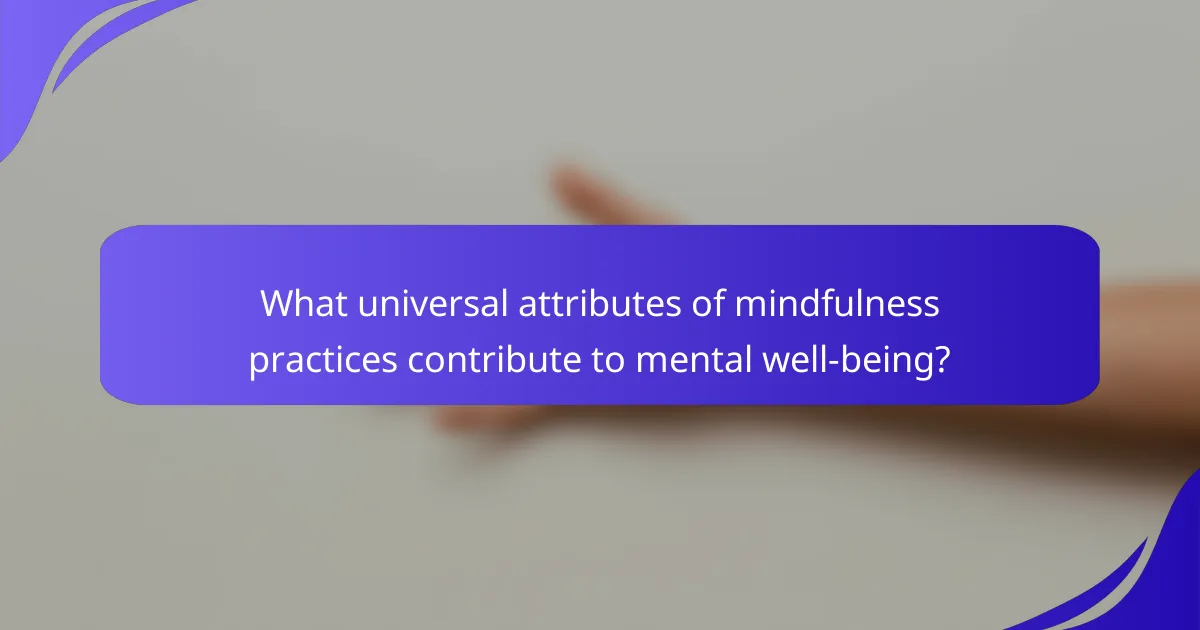
What universal attributes of mindfulness practices contribute to mental well-being?
Mindfulness practices universally enhance mental well-being by promoting present-moment awareness, reducing stress, and improving emotional regulation. These practices foster a sense of calm, enabling individuals to manage anxiety effectively. Regular engagement in mindfulness can lead to lasting changes in brain structure, enhancing focus and resilience. Studies indicate that consistent mindfulness practice can lead to a 30% reduction in anxiety symptoms, significantly benefiting men seeking improved mental health.
How does regular practice lead to long-term benefits?
Regular practice of mindfulness leads to long-term benefits by enhancing focus and reducing anxiety. Consistent engagement with mindfulness techniques strengthens neural pathways associated with attention and emotional regulation. Research shows that individuals practicing mindfulness regularly experience a 30% reduction in anxiety symptoms over time. Additionally, mindfulness fosters a unique attribute of resilience, enabling men to manage stress more effectively in challenging situations. As a result, these practices contribute to overall mental well-being and improved life satisfaction.
What are the common barriers to practicing mindfulness?
Common barriers to practicing mindfulness include distractions, lack of time, and difficulty in maintaining focus. Many men struggle with integrating mindfulness into their daily routines due to societal pressures and high-stress environments. Additionally, misconceptions about mindfulness being overly complex can deter engagement. A unique challenge is the stigma surrounding vulnerability, which may prevent men from exploring emotional awareness through mindfulness practices.
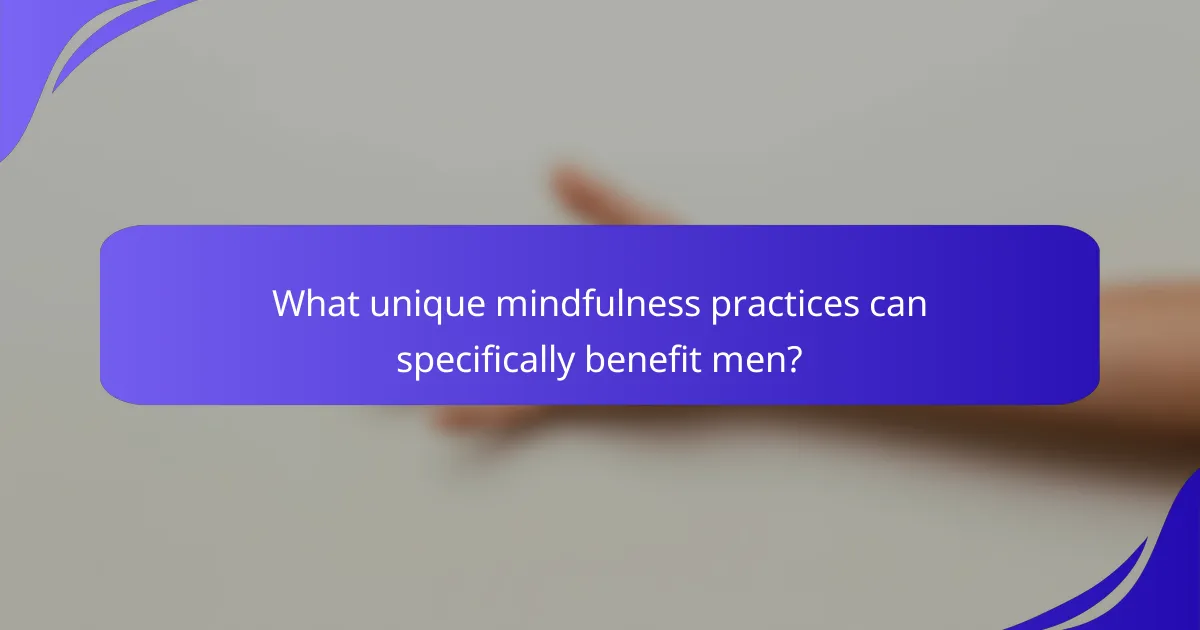
What unique mindfulness practices can specifically benefit men?
Mindfulness practices uniquely beneficial for men include focused breathing, body scanning, and mindful movement. These techniques enhance concentration and alleviate anxiety. Focused breathing helps regulate emotions, while body scanning increases body awareness. Mindful movement, such as tai chi or yoga, fosters mental clarity and physical balance. Engaging in these practices regularly can lead to improved mental health outcomes for men.
How can group mindfulness sessions enhance focus and reduce anxiety?
Group mindfulness sessions can significantly enhance focus and reduce anxiety in men. These sessions foster a supportive environment, promoting collective engagement in mindfulness practices. Participants often experience improved attention spans and reduced stress levels through shared techniques such as meditation and breathing exercises.
Research indicates that group settings can amplify the benefits of mindfulness, creating a unique attribute of social reinforcement. This community aspect encourages accountability and motivation, leading to more consistent practice. Additionally, group mindfulness can facilitate the sharing of personal experiences, which may reduce feelings of isolation and anxiety.
As a result, men participating in these sessions often report heightened emotional resilience and clarity of thought, making mindfulness a valuable tool for mental well-being.
What role do male-specific themes in mindfulness play?
Male-specific themes in mindfulness enhance focus and reduce anxiety by addressing unique stressors men face. These themes often emphasize strength, resilience, and emotional awareness, which resonate with male experiences. Research indicates that tailored mindfulness practices can improve mental clarity and emotional regulation for men, leading to reduced anxiety levels. Engaging in mindfulness can foster a supportive environment for men to explore vulnerability, ultimately promoting mental well-being.
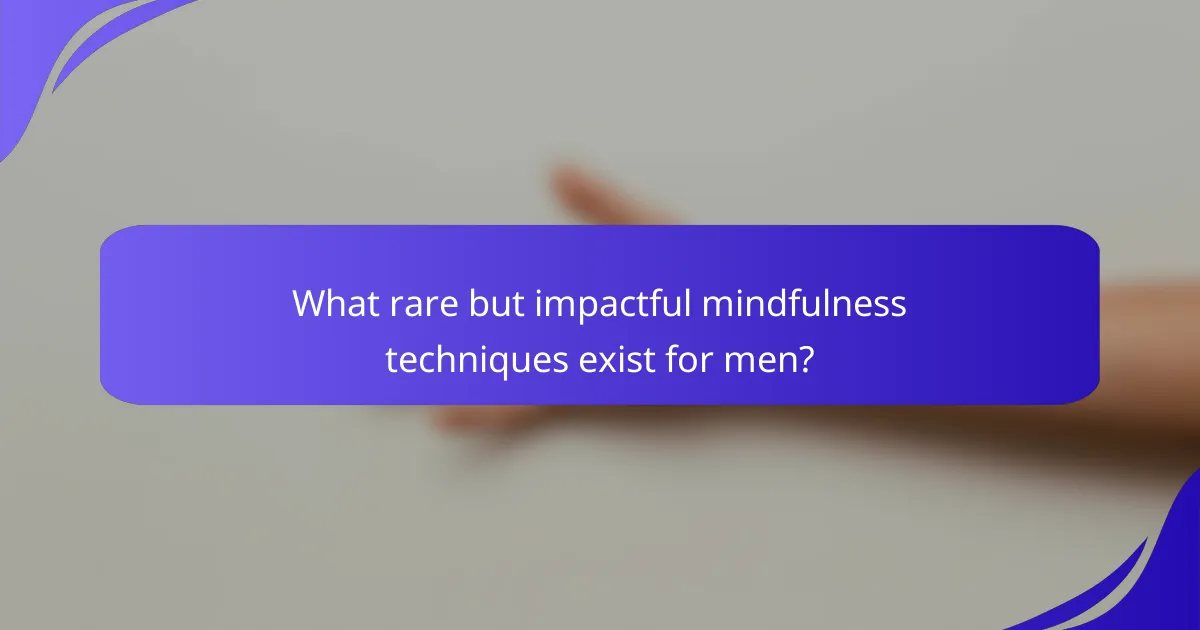
What rare but impactful mindfulness techniques exist for men?
Mindfulness techniques like forest bathing, sound bathing, and dynamic meditation offer unique benefits for men. Forest bathing, or Shinrin-yoku, involves immersing oneself in nature to reduce stress and enhance focus. Sound bathing uses sound waves from instruments to promote relaxation and mental clarity. Dynamic meditation combines movement with mindfulness to release tension and improve emotional well-being. These rare practices can significantly impact mental health and focus.
How can nature immersion enhance mindfulness practices?
Nature immersion enhances mindfulness practices by fostering deep focus and reducing anxiety. Engaging with natural environments can lower cortisol levels, which are linked to stress. Studies show that spending time in nature can improve attention span and cognitive function. Unique attributes of nature, such as its calming sounds and visual diversity, create an ideal backdrop for mindfulness exercises. As a result, individuals experience a heightened sense of presence, making mindfulness practices more effective and enjoyable.
What are the benefits of combining mindfulness with physical activity?
Combining mindfulness with physical activity enhances mental clarity and reduces anxiety. This synergy promotes a deeper connection to the body, encouraging present-moment awareness. Engaging in mindful movement, such as yoga or tai chi, can improve focus and emotional regulation. Studies show that participants often report lower stress levels and improved overall well-being. Regular practice of this combination can lead to lasting benefits for mental health in men.
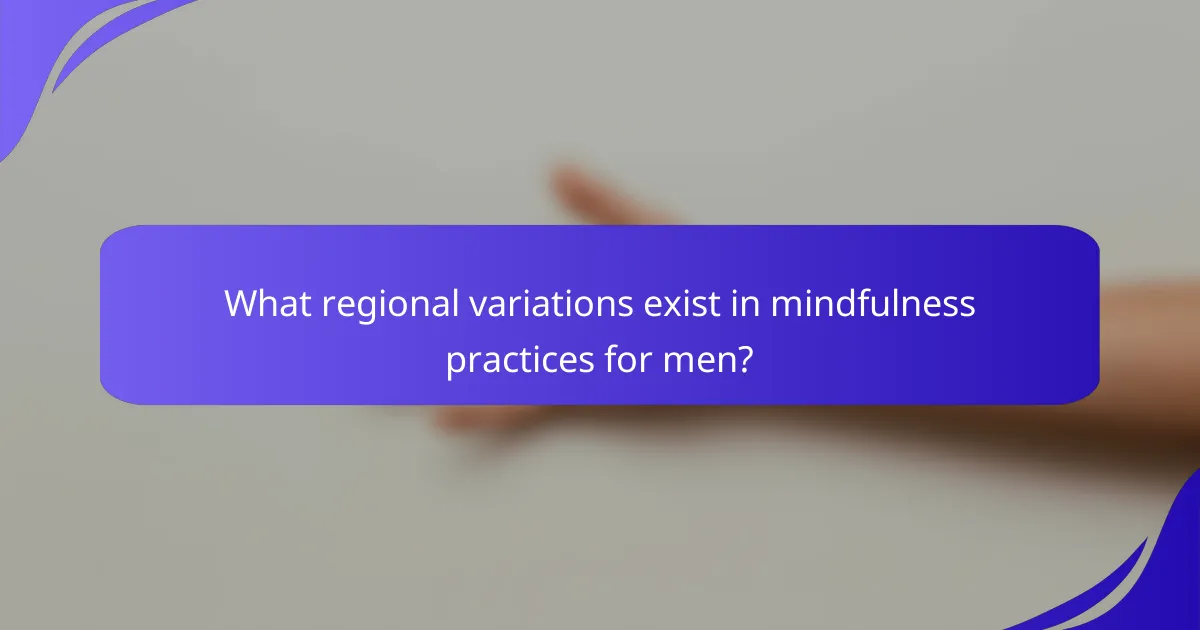
What regional variations exist in mindfulness practices for men?
Mindfulness practices for men vary significantly across regions, influenced by cultural beliefs and societal norms. In Asia, practices often integrate traditional meditation techniques, such as Zen in Japan or Vipassana in Thailand, focusing on deep introspection. In Western countries, mindfulness tends to emphasize stress reduction and cognitive behavioural approaches, often found in corporate wellness programs. African communities may incorporate mindfulness into communal activities, blending spiritual traditions with modern practices. Each regional variation offers unique attributes, enhancing focus and reducing anxiety through culturally resonant methods.
How do cultural perceptions of mindfulness affect practice?
Cultural perceptions of mindfulness significantly shape its practice, influencing techniques and their effectiveness. In cultures emphasizing collectivism, mindfulness may focus on community and shared experiences, enhancing social connections. Conversely, individualistic cultures often emphasize personal growth and self-awareness, leading to practices centered on personal reflection. These differing perspectives can affect the methods men choose for boosting focus and reducing anxiety, impacting their overall mindfulness experience. Understanding these cultural nuances can enhance mindfulness practices, making them more relatable and effective for diverse groups.
What local resources are available for men seeking mindfulness training?
Local resources for men seeking mindfulness training include community centres, yoga studios, and mental health organizations. Many offer classes specifically tailored for men, focusing on techniques to boost focus and reduce anxiety. For example, local mindfulness workshops may provide structured programs that incorporate meditation and breathing exercises. Additionally, online platforms may connect men with virtual mindfulness groups or individual coaching sessions, expanding access to resources beyond geographical limitations.
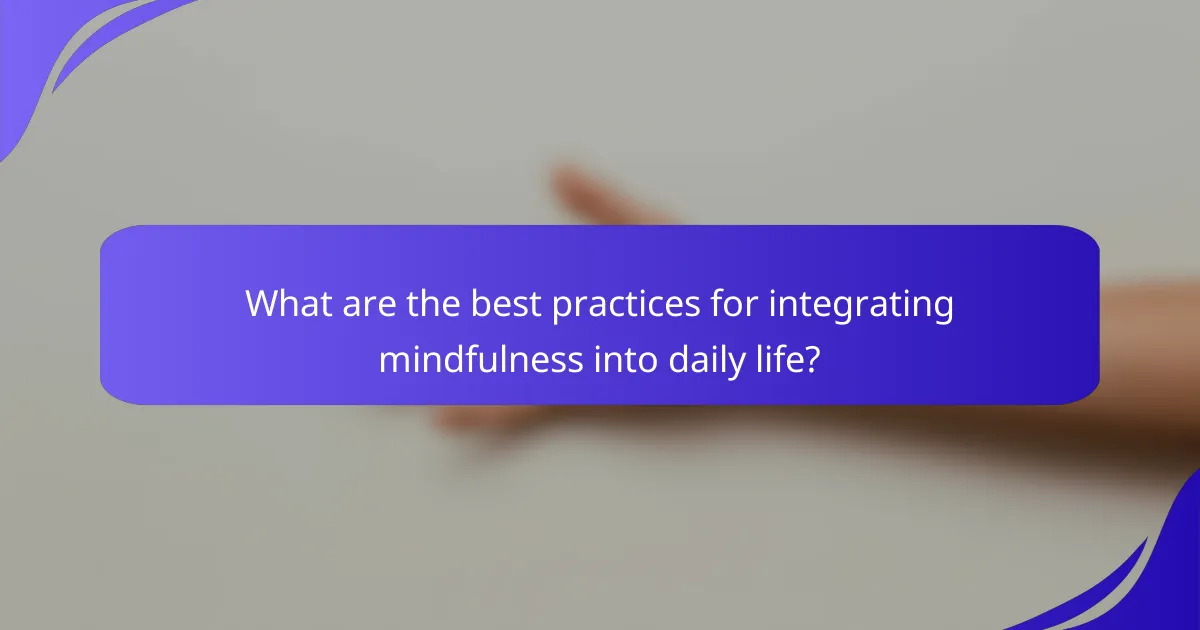
What are the best practices for integrating mindfulness into daily life?
Incorporating mindfulness into daily life enhances focus and reduces anxiety. Start by setting aside a few minutes each day for meditation. Engage in deep breathing exercises to centre your thoughts. Practice mindful eating by savouring each bite, which fosters awareness and reduces stress. Additionally, incorporate short mindfulness breaks during your day to reset and refocus. Finally, establish a consistent routine that integrates these practices, making mindfulness a natural part of your life.
What common mistakes should men avoid when practicing mindfulness?
Men should avoid common mistakes like being overly critical of themselves, expecting immediate results, and neglecting consistency in practice. Additionally, they should steer clear of distractions during mindfulness sessions, such as mobile devices or multitasking. Focusing on the present moment without judgment is essential for effective mindfulness. Engaging in self-compassion and allowing thoughts to pass without attachment enhances the mindfulness experience.
How can men optimize their mindfulness routines for better results?
To optimize mindfulness routines, men should focus on consistency, variety, and self-awareness. Establish a daily practice, incorporating meditation, breathing exercises, and mindful movement. Diversifying techniques enhances engagement and effectiveness. Tracking progress fosters self-awareness, aiding in identifying what works best.
What expert insights can guide effective mindfulness practices?
Mindfulness practices can significantly enhance focus and alleviate anxiety in men. Expert insights suggest integrating techniques like focused breathing, body scans, and mindful observation into daily routines.
Research indicates that consistent mindfulness meditation can reduce symptoms of anxiety by up to 58%, promoting emotional regulation. Additionally, incorporating short, structured mindfulness sessions throughout the day can improve concentration and productivity.
Engaging in group mindfulness activities can also foster a sense of community, which is beneficial for mental health. Practicing mindfulness in nature has been shown to enhance mood and reduce stress levels.
Ultimately, the key to effective mindfulness practices lies in regularity and adaptability, allowing men to tailor their approach to fit their lifestyles and needs.
